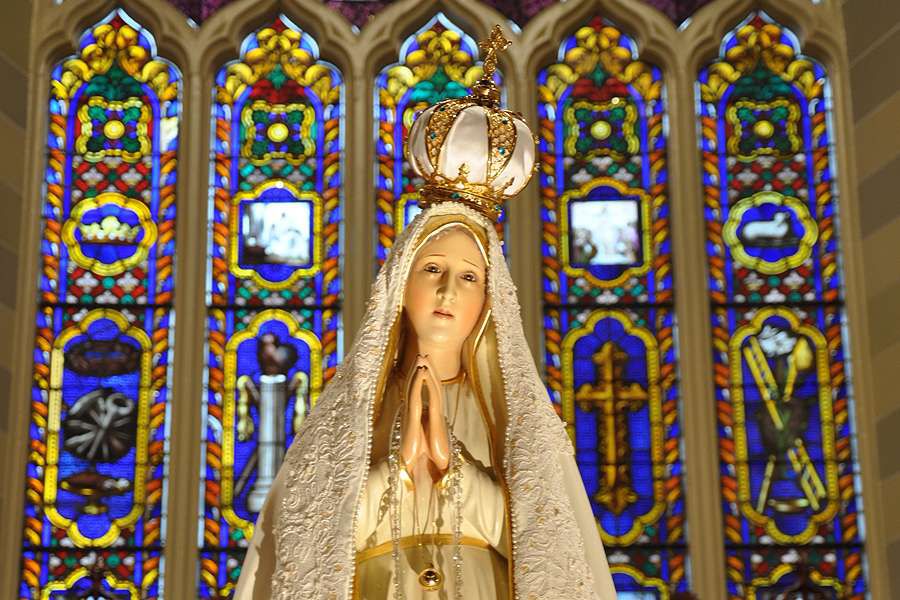The first time Our Lady of Fatima appeared to the shepherd children, she asked a question. For Father Mitch Pacwa, S.J., host of “EWTN Live,” this question could be addressed to each one of us today.
“We certainly are inheriting a lot of problems that have been percolating for a while,” he told a crowd of hundreds gathered Sept. 9 at the DCU Center in Worcester, Mass. for the EWTN Family Celebration. “We’re certainly seeing a lot of tension in our country that’s even different from the sixties: there’s more tension and anger at one another than we’ve seen since the sixties, and perhaps a bit more intense.”
“We pray that we can avoid the mistakes that came by the failures to listen to the message of Fatima,” Fr. Pacwa said. Like she asked the shepherd children a century ago, “(Our Lady) asks the question each one of us has to answer: ‘Are you willing to offer yourselves to God and bear all the sufferings He wills to send you, as an act of reparation for all the sins by which He is offended and for supplication for the conversion of sinners?’,” the priest said.
In 1915, an angel appeared near Fatima, Portugal to young Lucia dos Santos and three of her friends as they prayed the rosary in the fields. An angelic figure later appeared on several occasions to Lucia and her two cousins, Francisco and Jacinta Marto. The figure spoke to them about Jesus’ and Mary’s “plans of mercy” and on his last visit gave them Holy Communion.
On May 5, 1917 Pope Benedict XV published a pastoral letter asking the faithful to ask Mary to bring an end to World War I. Eight days later, the Virgin Mary appeared to Lucia and her cousins. In a series of six apparitions, she asked them to recite the Rosary and to make sacrifices on behalf of sinners. She also brought them a three-part secret regarding the fate of the world, urging the consecration of Russia to her Immaculate Heart.
This Oct. 13 will mark the 100th anniversary of the “Miracle of the Sun,” when some 70,000 people gathered in response to the children’s reports and witnessed the sun spin and twirl in the sky, at one point seeming to veer towards earth before returning to its place. For Fr. Pacwa, the historical context was important to remember.
“We can look back at many points in history and see God’s activity as appropriate for its own place and time,” he said.” God is not there to waste effort and time, but rather to have a purpose for the salvation of the world.” “And Fatima is an event that occurs at something of a key turning point in the history of western Christianity. And for all Christianity in the world,” he said.
At the time, Portugal itself was under the influence of Masonic government officials, and revolution was stirring in Russia. The western world was formed by atheistic philosophies, nationalism and a Darwinian “survival of the fittest” mentality that ignored “the weeping mothers and fathers of the sons who died” in the war.
“In 1915, Pope Benedict ordered all the churches to pray for the Sacred Heart for peace. Germany, France and Spain refused to pray for peace,” Fr. Pacwa said. “They absolutely refused and would not allow the prayers to go on.” “That’s why in 1916, the angel of peace was sent to Fatima: to teach the children to pray. He was sent there to teach them especially that real prayer: ‘My God, I believe, I adore, I hope, and I love you. I ask pardon of you for those who do not believe, do not adore, do not hope, and do not love you.’ And they felt that strong hope of God’s presence.”
Fr. Pacwa emphasized the question of Fatima. “Are you willing to offer yourself?” he asked, saying this is something each Catholic can and ought to do every time he or she goes to Mass. “At the offertory, offer ourselves with the bread and the wine, so that when Christ transforms the bread and wine at the consecration, and transubstantiates it into his Body and Blood, so also he may take our offering of ourselves and transform it to him, unite our self-offering with his offering on the cross.”

